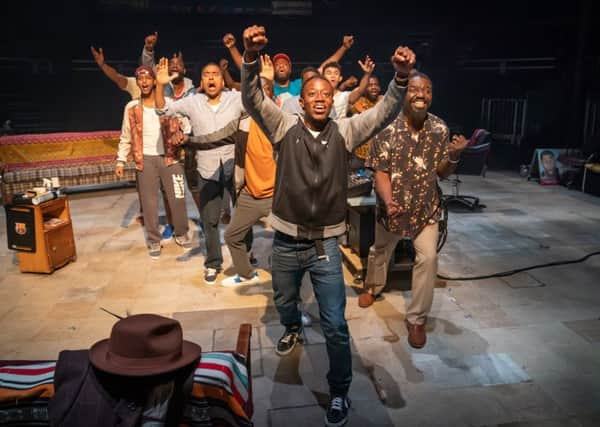Barber Shop Chronicles star Anthony Ofoegbu on the hit show that “warms up every organ in your body”


Yet it was only a year or so later that Ellams began talking to his producer, Kate McGrath of the London-based Fuel company, about a much bigger idea that was beginning to take shape in his mind, inspired by a leaflet he had seen about barbers in London being offered training to help them offer the right advice to men who, in the barber’s chair, suddenly start to talk about serious problems in their lives that they feel they cannot share with anyone else.
Ellams says that he sometimes thinks of his plays as “failed poems” – ideas that won’t fit into verse, but voices that get louder and louder, and bigger in number, until they turn into dialogue; and over six years – with support from Fuel, then later from the National Theatre in London and Leeds Playhouse – he worked on the development of his barber shop idea, visiting barber shops in South Africa, Kenya, Uganda, Nigeria and Ghana, as well as near his home in south London, and making detailed notes of the conversations among men that he heard there, which he gradually transformed into his own powerful brand of stage poetry.
Advertisement
Hide AdThe result was Ellams’ smash-hit show Barber Shop Chronicles, which opened at the National Theatre in June 2017 – in a production by Bijan Sheibani, with choreography by Aline David – and has gone on to tour the world, visiting Australia, New Zealand, the US and Canada to huge acclaim in the last two years. Now, as part of a UK tour, it visits Inverness and Edinburgh, before returning to New York in December; and playing the key role of Emmanuel – the co-owner of a barber shop in Peckham, one of the six barber shops across Africa and the UK portrayed on stage – will be actor and dancer Anthony Ofoegbu, who joined the show in 2018, and has since come to see himself and the rest of the cast as “ambassadors” for a much-needed message of shared human experience, in an age of ever-increasing division.
“I think this is a show that’s very much needed right now, and that’s why audiences everywhere respond to it so strongly,” he says. “It offers a black and African perspective on our lives today that just isn’t heard often enough, and it celebrates the humanity of black men, who are so often subjected to negative portrayals. We’re living in a time of turmoil, with the rise of the far right; and I think the strength of this show is that through the voices of the characters, all over the world, it tells some pretty unapologetic truths about that. And with that truth – and the music, and dance, and the way this show reaches out to the audience – it’s an experience that really warms up every organ in your body, as well as your mind and spirit, and turns into a real celebration of what we share, as human beings.”
The show is set on the day of a major football match between Chelsea and Barcelona, which is being watched in all the barber shops, from Harare to London; and as so often in conversation among men, football becomes the key to exchanges that soon begin to take in a whole range of issues, from love and loss to trouble at work.
“When you’re talking about a barber shop where black men go,” says Ofoegbu, “you’re often talking about a place with a special role in the community. For centuries, black families have been disrupted by slavery and economic pressures. Father figures can be in short supply, and when a young black boy starts to go to the barber’s, he finds older men there that he can really open up to. It’s one of the places where you can learn how to be a man, and how to take responsibility for yourself.”
Ofoegbu himself grew up in East London, with an Irish mother and a Nigerian father who hoped that his son would follow him into the NHS. Ofoegbu wasn’t an academic school student, though; and it was while he was at further education college that “theatre came and found me,” through a dance class that inspired a passion for physical theatre, and carried him onto the professional stage in the 1980s and 90s. Thanks to his family background, he also had a strong facility for different accents – London, Nigerian, Irish – and began to play non-dance roles, developing, among other things, a strong interest in the work of Nigerian poet and playwright Wole Soyinka; and it was when he was working with National Theatre associate Bijan Sheibani at HOME in Manchester, on a play by American dramatist Annie Baker, that Sheibani noted his “Nigerian-Celtic” background, and asked him to join the cast of Barber Shop Chronicles.
“So theatre really has been my education,” says Ofoegbu. “I’ve learned so much. For me, though, this is also partly about my late father; keeping his memory alive, keeping his voice alive, and giving the same kind of respect and attention to the black men who appear in the story. What’s incredible about this show is how Inua Ellams has gone to all these countries, and recorded these live conversations, and made it into a story that’s full of local truths, and yet spans the whole world. And no matter who you are – whatever creed, or colour, or language – you’re going to feel that; and you’re going to love it.” Joyce McMillan Barber Shop Chronicles is at Eden Court Theatre, Inverness, from 16-19 October, and the Lyceum Theatre, Edinburgh, from 23 October until 9 November.